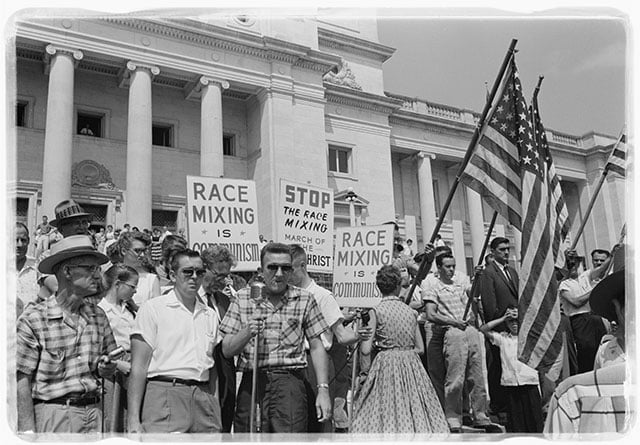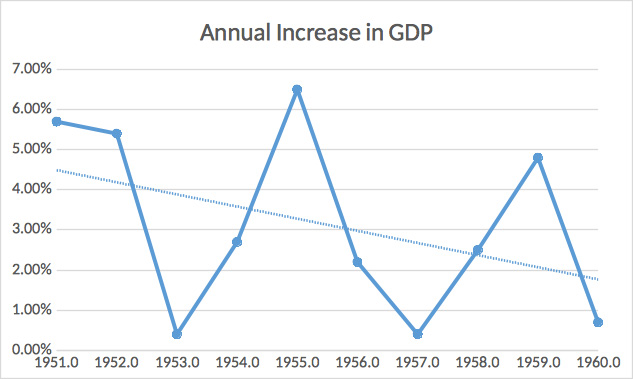
From Bernie Sanders calling violently anti-Communist President Eisenhower a socialist, to a plethora of op-eds hailing the allegedly great policies the Republicans had toward labor and refugees, you have probably seen at least one liberal in your life mourn the loss of the Republicans of the so-called “Golden Age of Capitalism,” the 1950s. These arguments usually rest on the achievements of that time, such as the desegregation of the military, a corporate tax rate of 50 percent, a top income tax rate of 91 percent, a rate of profit that stood above 20 percent throughout the decade and annual average Gross Domestic Product growth of 3.13 percent.
 (Source: US Bureau of Economic Analysis; author’s calculations)
(Source: US Bureau of Economic Analysis; author’s calculations)
While most of these achievements are objectively true, this argument of the “once-good” Republican Party can only be sustained when one ignores the context in which these policies were created, the violent campaign against Communism domestically and abroad, and the caveats and exceptions to the policies that predominantly created wealth and welfare at the expense of people of color.
The Context
While there are disagreements as to the level of responsibility, it is generally agreed by economists and historians that the United States escaped the Great Depression, at least in part, by its engagement in World War II. There are two facets of how the war improved the economy: (1) Governmental investment and even takeover of industry created jobs and recycled stagnant fixed capital, such as factories and machinery; and (2) By bombing the post-war foreign competition out of existence, at least for a significant amount of time. The positive effect of the war on the economy was undeniable at the time, and it was a reality that the small government Republicans had to accommodate to.
But that certainly does not mean that they did not try to push for deregulation and a “free market” in the little ways that were politically feasible. President Eisenhower’s election was in part due to the capitalists of the time becoming fed up with the Democrats’ intervention, such as President Truman’s failed attempt to seize the Youngstown Sheet & Tube Company to end strikes. President Eisenhower would employ the virtually opposite tactic during the Steel Strike of 1959 by using the “back-to-work” provision of the Taft-Harley Act. Ironically, the dispute was only settled by a politically ambitious then-Vice President Richard Nixon stepping in and telling steelmakers it was better to settle before the Democratic Congress began hearings on the strike, which would not be as supportive of the companies as Eisenhower was.
Republican US Imperialism at a Discount
With the current political debate around refugees, many liberals have pointed to the Refugee Relief Act of 1953 to shame the Republicans for their opposition to accepting more refugees. The Act did indeed result in 214,000 immigrants gaining admission to the country. But the problem is that under this Act, most — if not all — of the Syrian refugees would have been denied entry. The quotas for the Act were as follows: 90,000 West Germans and Austrians; 10,000 from NATO members, Turkey, Sweden, Iran and Trieste (now part of Italy); 2,000 Polish veterans; 60,000 Italians; 17,000 Greeks; 17,000 Dutch; 4,000 for those residing in US consulate districts in the “Far East;” 2,000 Chinese; and 2,000 for Jews and Palestinians of the new Israel who were part of the UN’s refugee program.
These quotas show two things: (1) An obvious bias against people of color, with no quota whatsoever for North Africans who were affected by WWII and a pitifully small one for Chinese and Middle Eastern people; and (2) This Act was part of the Republican strategy against Communism abroad by rewarding NATO members and Western Europe. Iran is particularly notable because it was that same year, 1953, that Eisenhower’s administration pioneered a new, cheaper version of overthrowing foreign democratic governments through a single CIA agent instigating a coup against the recently elected Prime Minister Mohammad Mosaddegh. The strategy was so successful that they did it again in Guatemala the next year, despite the previous Truman administration having aborted a similar mission in 1952 after public pressure.
Who Was Left Behind in the Golden Age?
US capitalism’s “Golden Age” wasn’t so golden for the people of color residing in the country. Despite the desegregation begun by President Truman and continued by President Eisenhower in the military, no effort was made to ensure that the Black veterans had equal access to the benefits of such service by either the Democrats or Republicans. President Eisenhower was the second Republican president in history get a plurality of the Southern votes during 1956, and despite his enforcement of the law at Little Rock, Arkansas (which he always maintained was not about integration, but about federal power), sympathized strongly with the Southern whites and their racist views on topics like “miscegenation.”
The 83rd Republican-controlled Congress passed laws that criminalized affiliation with Communist organizations, which Attorney General Herbert Brownell, Jr., promptly used to shut down the Communist-affiliated Civil Rights Congress, which is most famous for the “We Charge Genocide” petition to the United Nations. Congress also began the privatization of the infamous Fannie Mae, ensuring that greed was prioritized over public good and setting the mortgage market down a path that has and continues to redline Black communities and systemically deprive them of wealth.
The Danger of Nostalgia
Many Bernie Sanders supporters have wondered why their candidate was not able to garner as much support from the Black community when his policy proposals were far more in favor of Black people than those proposed by Hillary Clinton. I have watched Senator Sanders’ career for a long time, since I was a teenage community organizer lobbying for the Employee Free Choice Act, and I’ve observed him expressing the perverse kind of nostalgia that many older white leftists do for the 1950s and its middle class. Many women and people of color are justifiably skeptical about plans packaged as bringing back a “Golden Age” where they faced broad discrimination with little recourse. A political revolution against our current system would not be the return to a less megalomaniacal Republican Party, and certainly not the election of a xenophobic fascist billionaire who is an outsider in name only. The political revolution is happening every day, being carried about by the working class and the youth who know that this two-party system is a fraud. Consider this an invitation to join.
Our most important fundraising appeal of the year
December is the most critical time of year for Truthout, because our nonprofit news is funded almost entirely by individual donations from readers like you. So before you navigate away, we ask that you take just a second to support Truthout with a tax-deductible donation.
This year is a little different. We are up against a far-reaching, wide-scale attack on press freedom coming from the Trump administration. 2025 was a year of frightening censorship, news industry corporate consolidation, and worsening financial conditions for progressive nonprofits across the board.
We can only resist Trump’s agenda by cultivating a strong base of support. The right-wing mediasphere is funded comfortably by billionaire owners and venture capitalist philanthropists. At Truthout, we have you.
We’ve set an ambitious target for our year-end campaign — a goal of $205,000 to keep up our fight against authoritarianism in 2026. Please take a meaningful action in this fight: make a one-time or monthly donation to Truthout before December 31. If you have the means, please dig deep.